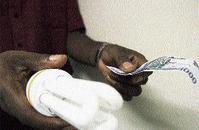
Four million energy-saving light bulbs, or compact fluorescent lamps, are being distributed freely to householders islandwide under the Jamaica-Cuban Energy-Saving Project. Jamaica alsostands to earn millions of dollars in carbon credits. - Photo by Ross Sheil Government expects to earn Jamaica $160 million in 'carbon credits' from its joint energy-saving light bulb project with Cuba, but according to one local expert, that figure should be many times more.
Cuba donated four million of the bulbs, also known as compact fluorescent lamps (CFLs), to Jamaica which are being distributed free of charge to households islandwide.
Minister of Industry, Technology, Energy and Commerce Phillip Paulwell maintains the US$160 million, arrived at by consultants currently tendering for 'the Jamaica-Cuban Energy-Saving Project', is a "conservative" projection. But that figure could reach US$8 million (J$545 million), according to Mikael Oerbekke, principal of Eco-Tec, the first entity to sell carbon credits from Jamaica earned by its distribution of 80,000 CFLs to north-coast hotels.
Conservative projection
Eco-Tec's projection is also conservative, says Oerbekke.
The Bluefields, Westmoreland-based company was previously in discussions over the Government project, but withdrew its interest, concerned that credits might not be verifiable based on what it claims was inadequate documentation of the distribution, being carried out by joint teams of Jamaican volunteers and Cuban social workers. The ministry denies this, maintaining that 'not one bulb' will be unaccounted for.
Eco-Tec believes US$8 million (J$545 million) can be earned from the project, a projection which is also conservative, says Mr. Oerbekke. That projection is based on a projected megawatt saving to the national grid of 59.4 - this is 20 MW less than the 80MW on which the ministry's figure is based.
Oerbekke also says Eco-Tec managed to find a buyer, impressed with his company's initial project. He says his buyer was prepared to pay US$650,000 (J$44 million) for just over 300,000 bulbs.
Government has previously earned credits, via a deal with the Netherlands, from its Wigton Wind Farm, which is being privatised. The Netherlands bought the credits to offset their greenhouse gas emission targets set by the United Nations (U.N.) Kyoto Protocol Clean Development Mechanism (CDM) in 1997.
In the three years since it began operations in April 2004, the Government-owned Wigton Wind Farm in Manchester has sold €424,763 (J$39 million) of credits. A further €251,490 (J$23 million) generated in the past year is yet to be verified.
ross.sheil@gleanerjm.com
What are carbon credits? Carbon credits are earned by the CFL project from the resulting reduction in polluting greenhouse gases that would otherwise be emitted by burning oil to generate electricity where incandescent bulbs are still used, which are less efficient and have a shorter lifespan.
Credits are central to the Kyoto Protocol and are an attempt to slow global warming whereby polluters in developed countries effectively compensate the efforts of those who reduce emissions.
CDM credits can be bought by governments or entities to meet their emission reduction targets, set by the protocol or on a national basis.
Voluntary emission reductions are also traded internationally, usually bought by environmentally concerned individuals or entities. For instance, an individual can purchase credits to offset greenhouse gases emitted by their journey on an airliner; or perhaps a company might look to buy credits generated by a environmentally appealing project, which would benefit their corporate image.

